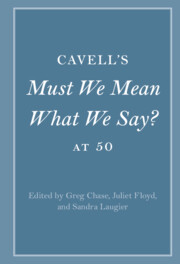Book contents
- Cavell’s Must We Mean What We Say? at 50
- Cambridge Philosophical Anniversaries
- Cavell’s Must We Mean What We Say? at 50
- Copyright page
- Contents
- Contributors
- Acknowledgments
- Abbreviations for Cavell’s Works
- Introduction
- Part I Ordinary Language and Its Philosophy
- Part II Aesthetics and the Modern
- Part III Tragedy and the Self
- Bibliography
- Index of Names and Subjects
- Index of References to Cavell’s Works
Introduction
Published online by Cambridge University Press: 03 March 2022
- Cavell’s Must We Mean What We Say? at 50
- Cambridge Philosophical Anniversaries
- Cavell’s Must We Mean What We Say? at 50
- Copyright page
- Contents
- Contributors
- Acknowledgments
- Abbreviations for Cavell’s Works
- Introduction
- Part I Ordinary Language and Its Philosophy
- Part II Aesthetics and the Modern
- Part III Tragedy and the Self
- Bibliography
- Index of Names and Subjects
- Index of References to Cavell’s Works
Summary
The revolutionary significance of Must We Mean What We Say?, Stanley Cavell’s first book and the best introduction to his thought, becomes increasingly evident fifty years after its publication, confronting us with newly relevant, transformative thinking about modernism, the idea of culture, ordinary language philosophy, the history of twentieth-century analytic philosophy, American philosophy, the 1960s, Wittgenstein, Rawls, Kant, Kierkegaard, Beckett, Shakespeare, and such eternal philosophical themes as truth, passion, utterance, self-knowledge, skepticism, and the value of criticism. Cavell’s intervention in ordinary language philosophy revolutionized its practice, overcoming its dogmas and challenging the analytic tradition from within, broadening its audiences. His focus on self-confrontation as central to philosophical practice, the shepherding of ordinary utterances into uses within forms of life, shows that the philosophical preconditions of democratic thinking lie in the embedding of meaning in everyday life, rooted in the ethical and aesthetic aspects of how we mean what we say.
Keywords
- Type
- Chapter
- Information
- Cavell's Must We Mean What We Say? at 50 , pp. 1 - 12Publisher: Cambridge University PressPrint publication year: 2022

